Stories about...Graduate Education Reform
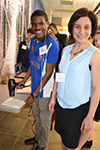 Centennial High Sophomores Experience Engineering/Entrepreneurship Courtesy of ME598 Grad Student Mentors
Centennial High Sophomores Experience Engineering/Entrepreneurship Courtesy of ME598 Grad Student Mentors
May 22, 2018
Dream of being on Shark Tank in a few years, lauding the merits of the unique product you designed and are marketing? Some budding young entrepreneurs from Centennial High School just might. For the second year in a row, these students in the AVID program had a chance to be mentored by Illinois Engineering grad students as part of the spring 2018 ME 598: Sustainable Engineering Outreach course. Facilitated by IRISE (the Illinois partnership for Respecting the Identities of Students in Engineering), the course was a win-win for both groups of participants. The six grad students had a chance to share their love of engineering and gain some skills regarding engineering outreach to underserved students. The Centennial 10th graders not only learned more about engineering and what it takes to be an entrepreneur, but networked with college students who could serve as mentors, not just now, but in the coming years. Plus, they gained some poster-making, presentation skills as they presented their posters at I-RISE’s May 2nd Final Poster Presentation/Awards Ceremony.
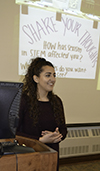 ESJ Scholars’ End-of-Semester Pecha Kucha Address Social Justice Issues in Engineering
ESJ Scholars’ End-of-Semester Pecha Kucha Address Social Justice Issues in Engineering
May 23, 2017
To showcase their final projects related to social justice issues they’re passionate about, eleven engineering undergrads who were part of the pilot for the new, two-semester-long Engineering for Social Justice (ESJ) Scholars program presented Pecha Kucha in an end-of-the-semester event. (In this Japanese presentation style, 20 slides are shown for 20 seconds each, keeping presentations by multiple speakers concise and fast paced). On hand to witness the May 8 final event, were a number of interested Engineering administrators, faculty, and members of the Illinois community.
FULL STORY
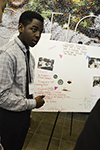 Engineering Grad Students Introduce High Schoolers to Engineering Via IRISE
Engineering Grad Students Introduce High Schoolers to Engineering Via IRISE
May 11, 2017
In spring 2017, IRISE (the Illinois partnership for Respecting the Identities of Students in Engineering) connected Illinois Engineering graduate students in the ME598EO course with local ninth-graders from Centennial High School’s AVID program. The goal was to use engineering to provide a solution to a problem in our local community. So the students sought to address obstacles athletes in the Illini Wheelchair Basketball Program encounter while training, competing, or just in everyday life. Not only did the grad students learn a lot about outreach; the high school students learned a bit about what engineers do, and a few even discovered that they might like to become one.>
FULL STORY
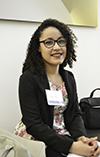 Community of Scholars Successfully Woos Underserved Undergrads to Illinois
Community of Scholars Successfully Woos Underserved Undergrads to Illinois
April 6, 2016
Seeking to increase the number of underserved students who attend graduate school at Illinois, the Graduate College invited undergraduate minority students from around the country to experience Illinois during Community of Scholars (COS), its spring campus visit program on March 6–8. Like its name implies, the goal of COS is to show visitors that, should they come to graduate school here, they would be valued members of a much larger community of scholars and would have access to numerous resources.
FULL STORY
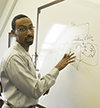 POETS Seeks to Change the Attitudes, Shape of Students in the STEM Pipeline
POETS Seeks to Change the Attitudes, Shape of Students in the STEM Pipeline
March 18, 2016
Andrew Alleyne, PI of the NSF-funded Center for Power Optimization of Electro-Thermal System (POETS), says the Center’s educational components are “all hypothetical at this point” and just “plans in people’s heads.” However, his plans and those of POETS’ Co-Directors of Education, Fouad Abd-el-Khalick (K-12 students) and Phil Klein (undergraduate/ graduate students), and Education Coordinator Joe Muskin appear to be well thought out and seek to strategically strengthen the education of targeted populations along the STEM pipeline.
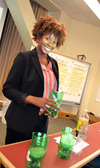 iRISE Course Prepares Engineers for Community Outreach
iRISE Course Prepares Engineers for Community Outreach
July 2, 2013
Illinois graduate students who are interested in sharing their love of engineering with youngsters now have a new course at their disposal—ECE 598 EO: Community Outreach for Engineering Researchers—through which they can learn the ins and outs of outreach. Developed by iRISE (Illinois Researchers in Partnership with K–12 Science Educators), the course trains graduate students how to develop design projects then teach them to local middle school students, with the goal of creating classroom-ready teacher materials.
FULL STORY
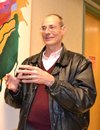 IGERT Trains Students at the Intersection of Neuroscience and Engineering
IGERT Trains Students at the Intersection of Neuroscience and Engineering
December 6, 2012
"We're trying to develop a culture and a community of people here on campus that are interested in the intersection of neuroscience and engineering."
According to program coordinator Pat Grenda, this is the goal of the Neuroengineering IGERT at Illinois. Short for "Neuroengineering: A Unified Educational Program for Systems Engineering in Neuroscience," the five-year Ph.D. program is funded by a National Science Foundation Integrative Graduate Education and Research Traineeship (IGERT) grant. In its fourth year, the IGERT currently has 45 students enrolled in four cohorts.
FULL STORY
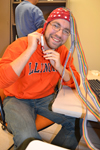 Neuroengineering IGERT Students Experience Interdisciplinary Research
Neuroengineering IGERT Students Experience Interdisciplinary Research
One student wants to discover how the brain enables complex thought, such as philosophy. Another wants a field rewarding enough to get him out of bed and to work every morning. Another student, who heard about the IGERT program while jogging, finds the psychology-engineering intersection intriguing and the engineering tools crucial to his work. Still another saw the IGERT as an opportunity to acquire resources, knowledge, and connections in the field of engineering that she wouldn't have had otherwise. No matter why students chose the Neuroengineering IGERT at Illinois, they find interdisciplinary research at the intersection of neuroscience and engineering to be challenging, yet exciting.
FULL STORY
 Robots and Real-World Problems:
Robots and Real-World Problems:
Michael Loui Tackles Engineering Education
October 24, 2011
Building robots and designing machines that solve real-world problems—it doesn't sound like the work of college freshmen, but professors in the College of Engineering at the University of Illinois have found that first-year engineering students are up to the challenge. Problem-based learning is a teaching method that gives students a specific problem to solve and leaves it up to them to come up with the solution. Engineering faculty have been using problem-based learning, or as engineers call it, design laboratory, for years. They have seen the benefits of the technique first-hand: it promotes problem-solving skills, develops creative skills, increases student retention, and promotes students' confidence in the subject area.
STORY













.jpg)
















